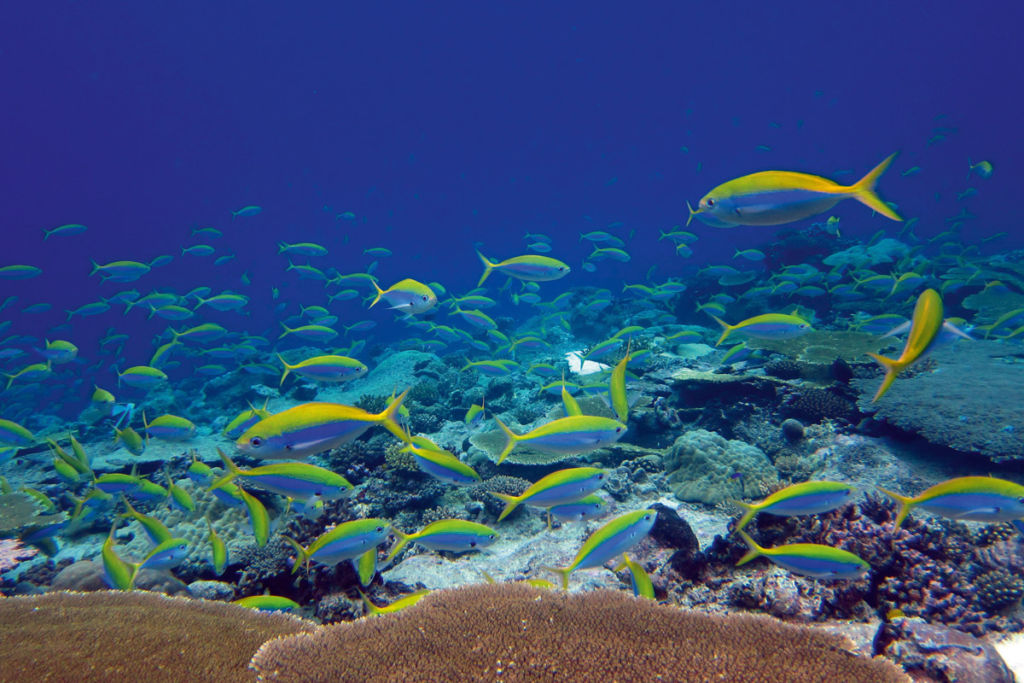[LUM#8] Too close to humans
Establishing marine reserves far from human activity? This measure may seem paradoxical, but it could well become a key lever in ocean conservation. At least, that is the conclusion of the latest major global study aimed at cataloging the fish and shark populations sheltered by coral reefs.

This study has surprised even the leading experts. "When I received the data, I thought it was a joke. A bad joke," says David Mouillot, an ecologist at the Marbec laboratory (Marine Biodiversity, Exploitation and Conservation) and member of the international consortium that conducted this major survey. The researchers observed 1,800 coral reefs, including 106 located in marine reserves, and found that only a third are inhabited by top predators such as sharks.
Far from men
Sharks prefer to settle far away from human presence: researchers have found these large predators on only 1% of reefs located near humans, compared to 59% on remote reefs. Not enough to make a new episode of Jaws. "Sharks are particularly sensitive to the noise generated by human activities, not to mention the presence of nets in which they can get caught." All the more reason to flee far from humans. Far from us.
Would common fish species tolerate our company better? Nothing could be less certain. According to David Mouillot, the reason why the balance sheet for reserves located near our coasts remains positive is primarily because "the comparison between the population inside a reserve and that found outside can only be positive, since there is nothing left outside! It's like if you got a 2 out of 20 and compared your score with someone who got a 0. You did twice as well, but you still got a 2."
Strong human pressure
To assess the extent of human pressure on these reserves and determine their actual effectiveness, researchers compared their biomass with that of the world's most isolated sites, such as Hawaii, the Chesterfield Islands, and the Chagos Archipelago. The results are clear: "The biomass in these reserves close to humans does not come close to that of these global reference sites. There is a gain, but the benefit is not huge compared to the performance of very isolated sites or the most protected reserves."
The issue, of course, is fishing. While these reserves are valuable in themselves, they represent only a tiny percentage of total marine areas. "As soon as the fish venture outside, they are caught, which prevents the population inside the reserve from developing normally," laments David Mouillot. In 2010, the Aichi Targets committed United Nations member states to placing 10% of their marine areas under protection by 2020. According to the researcher, this is still insufficient to combat overfishing.
Economic barrier
But how far should we go, or rather, how far should we not go to find this ocean untouched by human pressure? "Twelve hours of sailing! That's the threshold at which the cost of fuel [around €1,000] becomes prohibitive for fishermen and tourists. It's an economic barrier." David Mouillot, like other ecologists, is actively campaigning for higher fuel prices and an end to fishing subsidies . "It's a vicious circle: the more we subsidize, the fewer fish there are, and the fewer fish there are, the more we subsidize."
The researcher also highlights the damage caused by recreational fishing and urges individuals to abandon this cultural practice: "It's easy to take out a fishing rod, whereas we would never dream of killing a bird in our garden."
Expand reserves
After this study, is the divorce between fish and humans now final? Are the reserves near our coasts doomed? "No," says the researcher, "they remain useful, provided they are drastically expanded." As for isolated reserves, far from being useless or easy to maintain, "our study shows that they are the only effective protection for top predators . They must therefore not be neglected."
The reign of plastic
From the cold seas of Greenland to the isolated paradises of the Pacific, via the Mediterranean, microplastics are everywhere. Including in the samples that Delphine Bonnet, a researcher at the Marbec laboratory, collects off our coasts. "Every second, 206 kilograms of plastic are dumped into the ocean worldwide . " This mass pollution stems mainly from our everyday activities on land: "Microplastic beads are found in toothpaste, cosmetics, the fibers of certain synthetic clothing, and cigarette butts." These microplastics cannot be treated by current wastewater treatment plants and therefore end up in the sea. In collaboration with the Center for Functional and Evolutionary Ecology (CEFE), the researcher is trying to understand what role these disruptors may play in the ecosystem and what solutions can be put in place to reduce their presence. "70% of the microplastics found in the sea are single-use items. We all have a share of responsibility in this. We need to change our consumption habits and break free from the reign of plastic."
Find UM podcasts now available on your favorite platform (Spotify, Deezer, Apple Podcasts, Amazon Music, etc.).